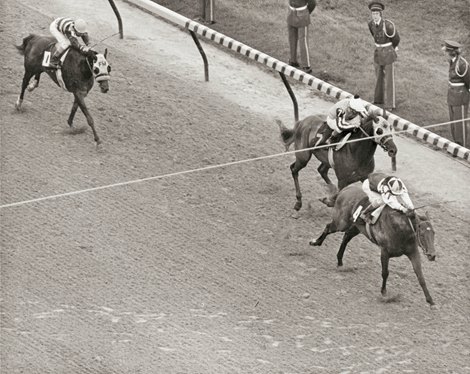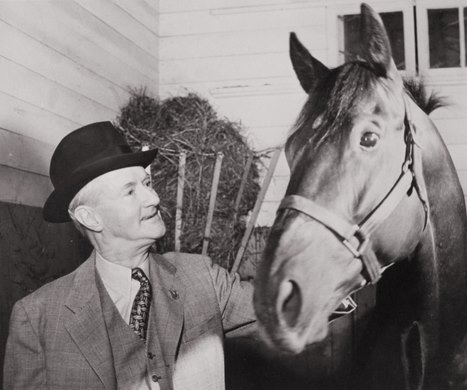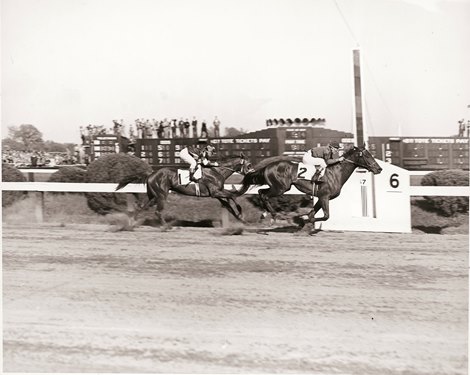Being unable to pay attention for more than 20 minutes at a time, I was in the kitchen feeding the cat on a recent Saturday afternoon when I heard someone on the TV machine summon the name of Chick Lang and describe him as a race caller of considerable renown, or words to that effect.
Wha-huh?
The occasion was the running of the Chick Lang Stakes (G3) on the undercard of the May 18 Preakness Stakes (G1). Charles John "Chick" Lang Jr. was for a long time the vice president and general manager of Pimlico Race Course. Before that he labored as agent for none other than Bill Hartack, that sour genius of the saddle. Lang wore a crewcut and a fishing vest festooned with the press pins of a thousand racing seasons. After Pimlico, he bounced around the game, always landing in a place where his contacts and his passion for the sport were happily welcomed. He was 83 when he died in 2010.
Lang also did a lot of media, mostly radio. But one thing he did not do was call races. Then who was the TV person talking about? Chick Hearn was the Hall of Fame announcer for the Lakers. Chick Corea was the slick jazz pianist and composer. Chick-fil-A serves a great bird, but still isn't open Sunday.
It must have been Charles David "Chic" Anderson, the man with the million-dollar vocal cords who rose to the top of his profession in the 1970s as the race caller for tracks such as Churchill Downs and Santa Anita Park and then the New York Racing Association. Anderson was a trained singer, and it showed. There have been some great voices at the microphone through the decades, burning special races into the memory with impromptu arias. But nobody sounded like Chic.
Anderson began calling the Triple Crown races for CBS in 1969. He called his last Preakness Stakes in 1976, his last Kentucky Derby (G1) in 1977 (the final three for ABC), and his last Belmont Stakes (G1) in 1978.
"We'll test these two to the wire!" Anderson proclaimed as Affirmed and Alydar took their pitched battle deep into the Belmont Park stretch.
As a last, lingering example of Anderson's craft, his call of Affirmed's agonizing victory over Alydar to win the Triple Crown provided a fitting memory, even though it came way too soon. Anderson died the following year from a heart attack, at age 47. He was appropriately mourned in racing and fondly remembered, but the Associated Press story announcing his death March 24, 1979, spent the entire third paragraph on his most famous flub.
"Anderson had the dubious distinction of calling the wrong horse in front in the 101st running of the Kentucky Derby in 1975," read the story. "With Foolish Pleasure grabbing the lead heading for home, Anderson told the crowd of more than 100,000 and a national television audience: 'Here comes Prince Thou Art taking the lead.'"

"That's terrible," said Larry Collmus, who has been calling Triple Crown races for NBC since 2011. "I've heard his Secretariat call a million times. It's legendary. That should be the one thing he is remembered for."
Collmus was citing Anderson's description of Secretariat "moving like a tremendous machine" on his way to winning the 1973 Belmont Stakes. Race callers can only pray they get a few soaring opportunities like that and are able to react accordingly. Collmus had his career moment in 2015 with American Pharoah , the first Triple Crown winner since Affirmed.
"I never met Chic Anderson, but it was Chick Lang who gave me my first job as an announcer," Collmus said. "He heard me calling races in the teletimer room at Pimlico and got me started calling one a day at Bowie as the backup announcer. I was 18."
With Fox now broadcasting the Belmont Stakes, the Triple Crown for Collmus and NBC is over. The announcer was inspired in his call of the Preakness victory by Seize the Grey and his 88-year-old trainer, D. Wayne Lukas.
Video
The 2024 Derby, however, was another beast altogether.
"Unfortunately for me, I was looking outside when Mystik Dan came inside," Collmus said, referring to the daring move of jockey Brian Hernandez aboard the ultimate winner. "Resilience and Stronghold were moving together on the outside, and their silks were very similar. I wanted to make sure I had the right one. I did say Resilience took the lead, and he never did. So as that happened, I picked up Mystik Dan a little later than I wanted to."
Video
Collmus is in good company. Anderson's Prince Thou Art goof lingers, and Tom Durkin was his own worst critic for catching Mine That Bird's dramatic rail run in the 2009 Derby way too late. But those guys have got nothing on the legendary Clem McCarthy, who went to his grave in 1962 still haunted by his botched call of the 1947 Preakness.

McCarthy was the premier sports broadcaster of his era. A prize fight or a horse race was second rate if McCarthy's gravelly radio voice was not telling the tale. His machine gun delivery and quick twitch reporting were perfect for the manic pace of racing, and more people listened to his broadcast of the Seabiscuit-War Admiral match than to Edward R. Murrow during the London blitz.
As the field for the '47 Preakness entered the far turn, On Trust led Jet Pilot, with Faultless trailing not far behind. Then, as the leaders reach the quarter pole, McCarthy can be heard saying, "And it is still On Trust heading for home, but he's got his hands full ... and the crowd blocks me for a moment ... "
For the next three critical seconds, McCarthy's view was completely obscured by a crush of fans who had climbed the starting gate parked in the infield. McCarthy did not see Faultless move up inside Jet Pilot. As far as he was concerned, it was Derby winner Jet Pilot who went after On Trust to win the Preakness by a length, and that's the way he called it.

Then, after a few seconds of dead air, McCarthy came back with, "What am I talking about? Ladies and gentlemen, I've made a terrific mistake. I've mixed my horses, and I've given you the winner as Jet Pilot ... and it is Faultless."
One year later, the starting gate was not parked in the infield.
In describing his vantage points for the Triple Crown races, Collmus notes that at Churchill Downs, the horses come almost straight at the announcer for a crucial few seconds of key shifting positions as the field turns into the stretch.
"The Preakness can be tough as well, but you've just got to deal with it," Collmus said. "The grass races on the undercard are worse because you're blocked by infield tents from the half-mile pole to the quarter pole. You have no choice but to go to the monitor."
During the telecast of this year's Preakness, a highlight package of the Derby was presented, with the call massaged to make it sound as if Collmus had Mystik Dan squarely in his sights all the way.
"They do that a lot when they do features," Collmus said. "They take snippets of calls and move them around to fit the narrative."
So at least there's that, for posterity. Neither McCarthy nor Anderson got to have a technological do-over, but at least the New York Times was a bit kinder at Anderson's passing, waiting until paragraph five to bring up Prince Thou Art. However, just like the AP obit, Anderson's Secretariat call is never mentioned. Seems like it's the fate of such a high-profile profession, to be remembered only for the mistakes.
"Jeez," said Collmus, "I hope not."








